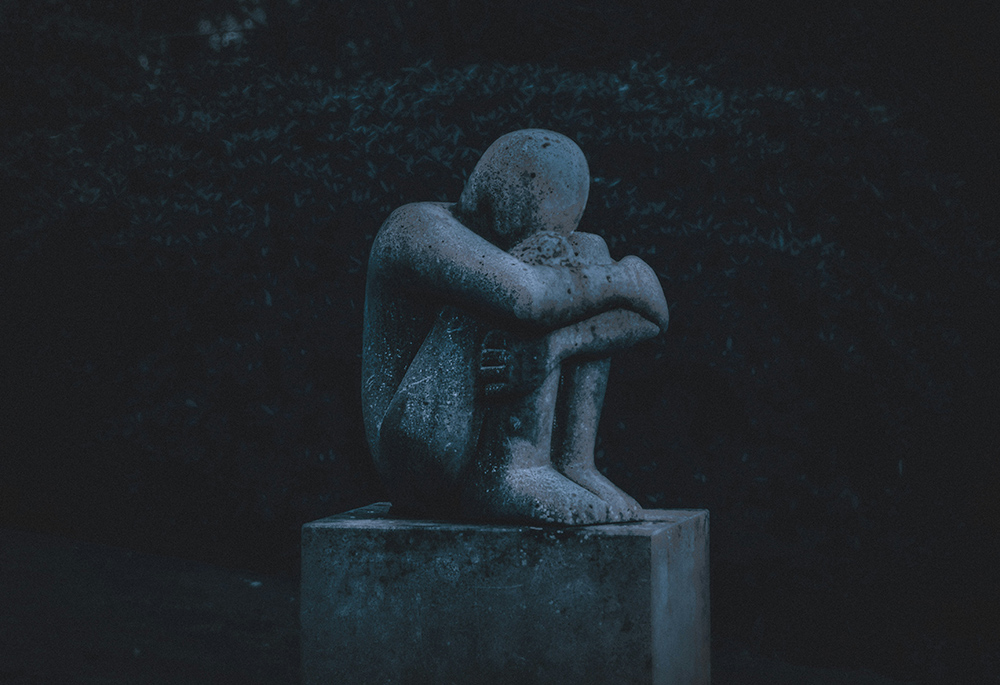
(Unsplash/K. Mitch Hodge)
You can't rush grief or grace.
After my son died, people tried to rush me through my grief. I felt pushed into stories that made others more comfortable, like the one about God having a plan, or my son being in a better place.
His death devastated me, and I wasn't ready for those stories. I felt isolated and resented those well-meaning friends and neighbors who preferred my experience of grief to be tidy and swift.
My son died many years ago, and I have gone through seasons of graced acceptance of his loss. I joined communities that have a more mature understanding of the Divine and are less threatened by complexity and the shadow side of spirituality.
After the election results, I gathered with my communities and found healing in sharing grief. The physical act of stepping away from the news and gathering intentionally in a church to talk over a meal reminded me of the power of community as the antidote to despair and the wellspring of prophetic action. We talked about not rushing grief, of allowing ourselves to experience the full range of emotions around the election. Friends discussed self-care, taking a break, fasting from social media to gather our strength for what comes next.
But in many conversations I noticed a pressure to rush grace, well-intentioned admonitions that to live like Christ we must welcome everyone. We must speed through grief towards acceptance and love. Could we reject people who vote differently or espouse policies that we find repugnant and say we follow Jesus who ate with sinners and tax collectors?
Advertisement
I believe there are people who can take the express lane to acceptance and compassion. People who can metabolize grief, forgive, and move to a place where they are ready to take action for justice. However, they are the exception. Most of us need time to discern and find clarity before we can take the right action. Forced compassion can be conflict avoidance in disguise.
The express lane to acceptance might also be an exit from the hard work of holding one another accountable. People voted for Trump for a variety of reasons, reasons that were valid for them. I have family members that I love deeply who voted for him. But the new administration is announcing actions that will harm those without power or money. Trump has promised to deport 11 million undocumented immigrants, and put a billionaire, Elon Musk, in charge of massive cuts to the federal budget, while promising tax cuts. What kinds of programs do we think will be targeted? Trump's record on climate change and care of the earth is bleak. His Supreme Court appointees changed the structure of reproductive health care, putting women at risk. How can we call mass deportations and women bleeding to death in hospital parking lots after a miscarriage anything but evil?
The express lane to acceptance might also be an exit from the hard work of holding one another accountable.
I feel the draw of fully accepting and welcoming people who support and work for policies I believe to be harmful. But I worry that is cheap grace rather than truly Christ-like compassion. Dietrich Bonhoeffer described cheap grace as "the preaching of forgiveness without requiring repentance." Bonhoeffer was a German pastor who spoke out vehemently and publicly against the Nazis, starting two days after Hitler's election as chancellor. The Nazis imprisoned and ultimately executed him.
How do we balance radical hospitality with the boundaries required to protect ourselves from those who are unconcerned or even jubilant about the impact of their choices on the vulnerable?
There are going to be holiday gatherings this year where family members are not welcome. Individuals who attack immigrants may not be invited to break bread with loved ones who are refugees or undocumented. Parents with trans or non-binary children may opt to not include fervent supporters of a president-elect who spent a significant portion of his marketing budget on advertising that mocked and vilified trans people.
How do we balance radical hospitality with the boundaries required to protect ourselves from those who are unconcerned or even jubilant about the impact of their choices on the vulnerable?
It is possible to set boundaries with compassion. If someone showed up in my yard waving a weapon, I would feel compassion for them, and try to get them whatever care they needed. But I wouldn't open my door and invite them inside.
Bonhoeffer also wrote “By judging others we blind ourselves to our own evil and to the grace which others are just as entitled to as we are.” Which I also believe. That's the tension, the complexity of the discernment process between grief and grace.
I refuse to be rushed through that space between grief and grace. I will continue to do the hard work of being in the questions, naming evil as I see it, discerning how to best respond, and protecting the vulnerable and oppressed in my community. We are all entitled to grace. But the cheap grace of avoiding the conflict inherent in holding one another accountable isn't actually grace, it is a distraction from the hard work of prophetic action which we can only do with a steely clarity about the evil we are facing and where it thrives.





